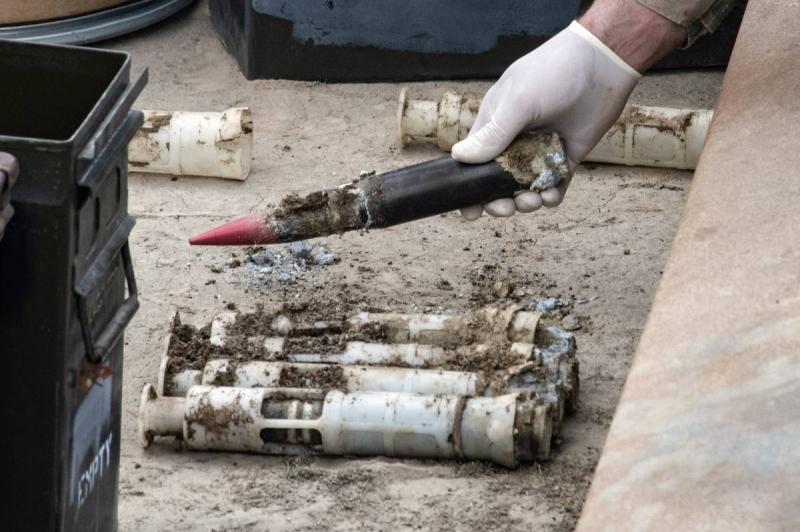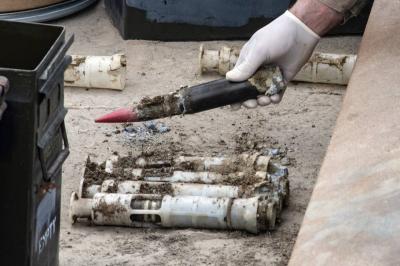The U.S. Department of Defense has announced that it will send depleted uranium armor-piercing munitions to Ukraine as part of a new aid package, a move described by a senior Russian official as a "criminal act." Here’s an overview of the concerns surrounding these weapons.
*What Are These Munitions?*
Depleted uranium is a high-density byproduct that remains after enriching uranium for use in nuclear reactors or weapons. Depleted uranium is radioactive, but it contains a much lower level of the isotopes U-235 and U-234 compared to natural uranium ore, which reduces its radioactivity. The International Atomic Energy Agency states that it is used in weaponry because of its high density and its self-ignition at high temperatures and pressures, as well as becoming sharper when penetrating armored plates. According to the Radiation and Radioactive Materials Museum of Oak Ridge Associated Universities in Tennessee, USA, "When depleted uranium munitions strike a target, the surface temperature rises significantly." It added that "when depleted uranium penetrates the targeted vehicle, larger fragments tend to consume everything inside, while the self-ignition of the uranium increases the likelihood of igniting the vehicle's fuel and/or ammunition." This means that when such munitions hit a tank's armor, they penetrate it in the blink of an eye before exploding into a flaming cloud of dust and metal, with the rising temperatures potentially causing an explosion of the fuel and ammunition inside the tank.
*Who Possesses These Munitions?*
The United States, Britain, Russia, China, France, and Pakistan produce depleted uranium weapons, which the International Coalition to Ban Uranium Weapons states are not classified as nuclear weapons. It is known that 14 other countries stockpile depleted uranium weapons.
*What Are the Risks?*
Numerous studies and debates surround the effects of exposure to depleted uranium weapons, particularly in combat zones where these munitions were used during the Gulf War in 1990-1991 and NATO bombing in Yugoslavia in 1999. The Royal Society, a fellowship of scientists based in London, states that approximately 340 tons of depleted uranium were used in munitions during the Gulf War in 1991, with an estimated 11 tons in the Balkans in the late 1990s. Ingesting or inhaling amounts of uranium, even if depleted, is dangerous, as it can impair kidney function and increase the risk of various types of cancer. Opponents of such weapons, including the International Coalition to Ban Uranium Weapons, argue that the dust produced can be inhaled, while munitions that miss their targets can contaminate groundwater and soil. However, Britain, which announced in March it would send this type of munitions to Ukraine, states in its guidelines that inhaling amounts of depleted uranium dust is unlikely to cause harm.
*What Does Science Say?*
The Royal Society reported in 2002 that the risks to kidneys and other organs from using depleted uranium munitions are very low for most soldiers in the battlefield and those living in conflict areas. However, it added, "Under extreme conditions, and in the worst assumptions, soldiers exposed to large amounts of depleted uranium may suffer harmful effects on the kidneys and lungs." It noted that "Environmental contamination will vary widely, but in most cases, health risks associated with depleted uranium will be very low. In some worst-case scenarios, certain areas may experience high levels of uranium in food or water, which could have harmful effects on kidneys." The International Atomic Energy Agency reported that a small number of veterans from the Gulf War have traces of depleted uranium in their bodies, resulting in elevated levels of depleted uranium in urine without causing any noticeable health effects. It added that studies on these veterans showed "a small increase (not statistically significant) in the mortality rate, but this increase is attributed to specific occurrences more than to diseases... that cannot be linked to any exposure to depleted uranium." A United Nations Environment Programme report on the impact of depleted uranium in Serbia and Montenegro stated there was "no significant and widespread contamination." However, some Serbian politicians have questioned this and reported an increase in deaths due to malignant tumors.
*What Did Russia Say?*
Reiterating Moscow’s previous warnings, Russian Deputy Foreign Minister Sergey Ryabkov stated that Washington is escalating the conflict in Ukraine by supplying Kyiv with this type of munitions. The TASS news agency quoted Ryabkov saying, "This is not just a provocative step; it reflects Washington's gross indifference to the environmental consequences of using this type of munitions on the battlefield. This is essentially a criminal act."




